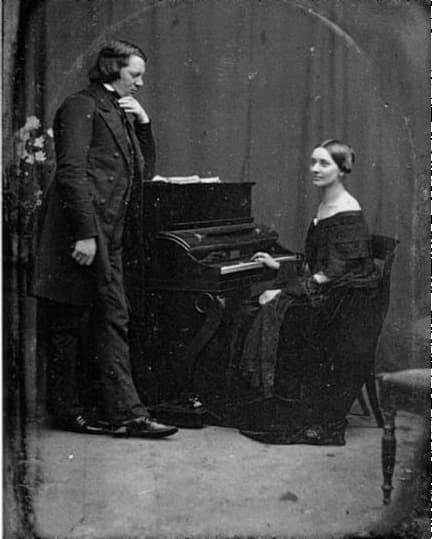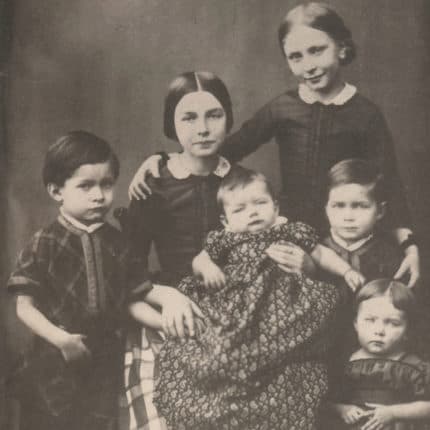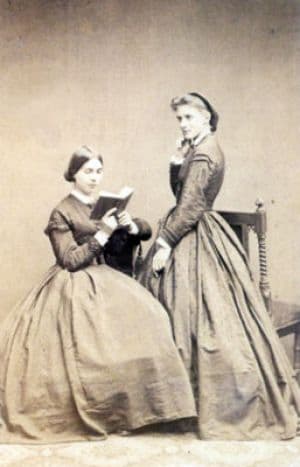The love story of Robert and Clara Schumann is one of the most famous in classical music history. Over the course of their marriage, Clara carried eight pregnancies to term. Today we’re looking at the remarkable stories of those children, and the indelible impacts they left on their parents’ lives.

Robert and Clara Schumann
Marie Schumann – 1841-1929
Marie Schumann was born on 1 September 1841, a few days before her parents’ first wedding anniversary. Her godfather was none other than Felix Mendelssohn.
In March 1846, Robert Schumann wrote in his diary that he had begun to teach Marie piano. During her childhood, she had a variety of music teachers, including her father, mother, half-brother, and even Johannes Brahms.
Catastrophe struck the family in early 1854 when Marie was only twelve. Robert had a mental breakdown and left for a mental hospital, where he would die a couple of years later.

The Schumann children
To support herself and her children, Clara threw herself into touring. Marie was thrust into the role of replacement mother to her siblings, a role she’d fulfill for the rest of her life. She never married and instead became her mother’s assistant. It’s not a stretch to say that Clara Schumann owed her ability to pursue her career to her eldest child. Marie was also the executor of the Schumann estate after Clara passed away in 1896, meaning all family papers that survived went through her. We don’t know what she may have chosen to destroy.
Robert Schumann: Kinderszenen (Scenes of Childhood), Op. 15 – No. 4. Bittendes Kind (Pleading Child) (Aldo Ciccolini, piano)
Elise Schumann – 1843-1928
Elise was also a kind of substitute maternal figure. She too studied piano and eventually helped teach her younger siblings, starting as early as 1853.
Elise’s professional life began in her late teens when she became a companion and live-in piano teacher. And although she was “shaking” in fear at the prospect, in 1865 she appeared publicly as a pianist. She would be the only Schumann child to ever perform alongside her famous mother.
Elise married in 1877 and had four children. She spent some time in America before returning to Europe.
Julie Schumann – 1845-1872

Marie and Julie Schumann
Julie was famous for being “the most beautiful” of the Schumann daughters. She was also very delicate and dealt with a variety of health troubles. She spent time living with family friends in more southern climates, where she met Count Vittorio Amadeo Radicati di Marmoritoin.
She married the count in 1869, and Johannes Brahms served as her best man. He had confusing romantic feelings for Julie that he never really verbalized, instead choosing to write them into his Alto Rhapsody.
Johannes Brahms: Alto Rhapsody, Op. 53 (Grace Hoffman, mezzo-soprano; Bavarian Radio Chorus; Bavarian Radio Symphony Orchestra; Rafael Kubelik, cond.)
Julie’s poor health was aggravated by childbearing. She had two children and died of tuberculosis when pregnant with her third.
Emil Schumann – 1846-1847
Emil Schumann, the eldest Schumann boy, died when he was sixteen months old. His father described him as “miserable and ailing.”
Robert Schumann: Kinderszenen (Scenes of Childhood), Op. 15 – No. 11. Fürchtenmachen (Frightening) (Aldo Ciccolini, piano)
Ludwig Schumann – 1848-1899
Ludwig Schumann’s story is deeply tragic. During his adolescence, it became clear that he had trouble functioning. Clara Schumann biographer Nancy Reich refers to his “lack of punctuality and irresponsibility.” Clara had him apprenticed to a book dealer, but eventually, he decided he wanted to be a musician, and Clara reluctantly began teaching him, not knowing what else to do to set him up for success. His condition deteriorated and eventually, he was sent to an asylum in Colditz, Germany.
Clara was not able to handle supporting her son emotionally. When she went to see him in 1874 he begged to leave and go back home with her. His condition and his begging were so painful that she only saw him a couple of times before ceasing her visits entirely.
Ferdinand Schumann – 1849-1891

Ferdinand Schumann
Ferdinand Schumann was called up during the Franco-Prussian War in 1870. While serving, developed rheumatism. Tragically, he became addicted to the morphine used to treat the pain.
He attempted to pursue a career in business. He married in 1873 and ultimately had seven children. However, he was never able to come to terms with his addiction, and he was unable to make a living. Clara became financially responsible for him and his family. Brahms noticed the fiscal strain and quietly gave her ten thousand marks to help defray expenses. After Ferdinand died “a broken man”, Clara and her widowed daughter-in-law fought, and eventually several of the surviving grandchildren became estranged from Clara.
Eugenie Schumann – 1851-1938
Eugenie Schumann, the youngest daughter, did not see much of her concertizing mother while growing up and had no memories of her father. Marie and Elise helped raise her, and she spent time at a boarding school, which she loathed and compared to the institution in Jane Eyre. In 1869 she began studying in Berlin, and also took lessons from her mother and Brahms.
In her twenties, Eugenie fell in love with a singer named Marie Fillunger. Fillunger lived for a while with the Schumanns, but eventually, the personalities in the household clashed. Although it was incredibly difficult for her, Eugenie did eventually leave her mother to live with Fillunger in Britain and work as a piano teacher.
Later in life, Eugenie wrote a memoir and a book about her parents before she died in 1938.
Felix Schumann – 1854-1879
Felix Schumann was born after his father had been sent to the mental hospital, and they never knew each other. Despite that, he more than any other child inherited Robert’s talents as a writer and a musician.
He was a sensitive boy and often treated as an afterthought, given the demands of Clara’s career and the many other siblings who needed attention. Tragedy struck in his adolescence when he came down with tuberculosis. He would struggle with ill health for the rest of his life.
He studied law, but he never had much of a passion for it, preferring music and writing, in circumstances eerily similar to his father’s. He wrote some poems that Brahms set to music. His perfectionist mother asked Felix that if he ever published his poetry, to do it under a pseudonym, so the family name wouldn’t be tarnished.
Eventually, his tuberculosis got worse and worse, and Clara reported that toward the end, his pain was unbearable to witness. His suffering was so traumatic for him and for witnesses that his oldest sister Marie held him as he died, shielding their mother from the sight. He died in February 1879, leaving unanswered the question of if his poetry could ever have gained a foothold in the canon, along with the music of his parents.
For more of the best in classical music, sign up to our E-Newsletter
Robert Schumann: Kinderszenen (Scenes of Childhood), Op. 15 – No. 13. Der Dichter spricht (The Poet Speaks) (Aldo Ciccolini, piano)




Fascinating! I’m working up Schumann’s Adagio and Allegro for Horn. It is a unique composition accompanied by piano, but was also written so that it be played on violin without transposing.
Schumann’s wife and family are also a unique story, and very interesting.
B C